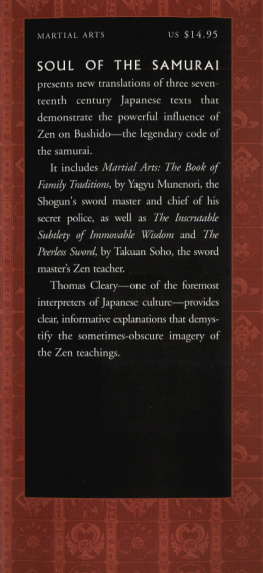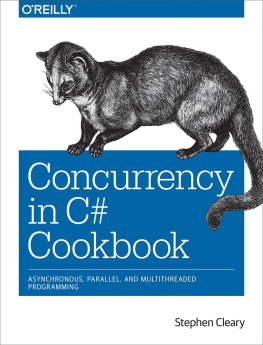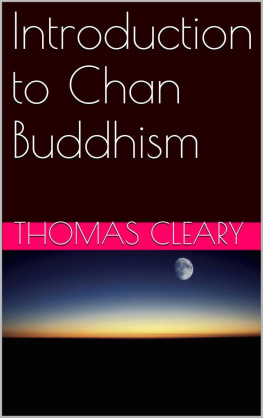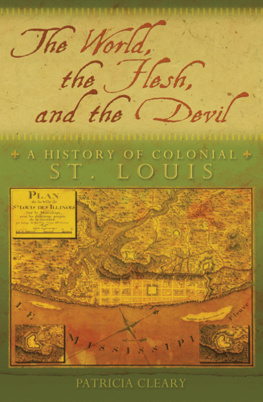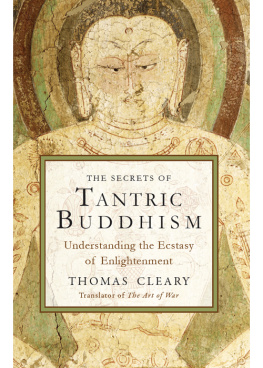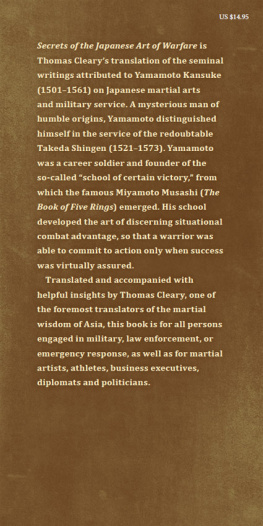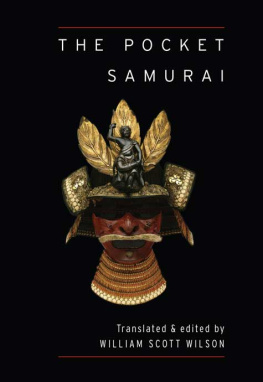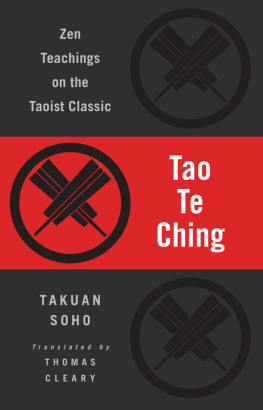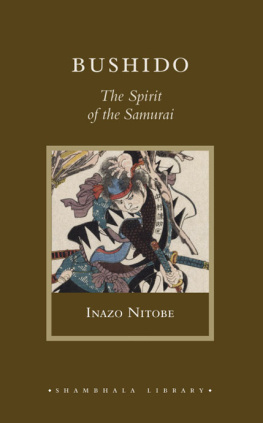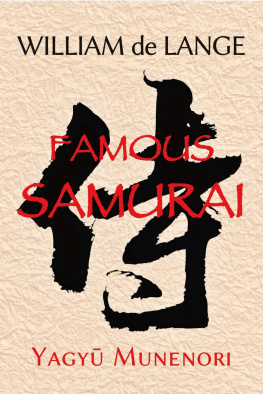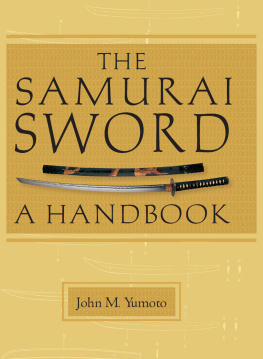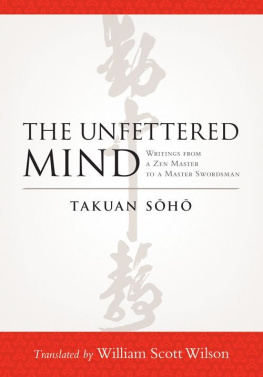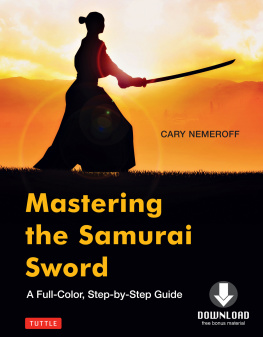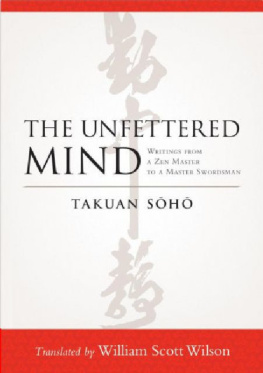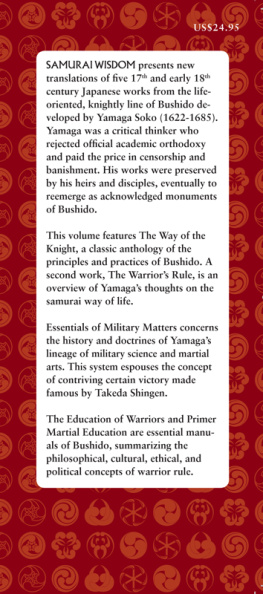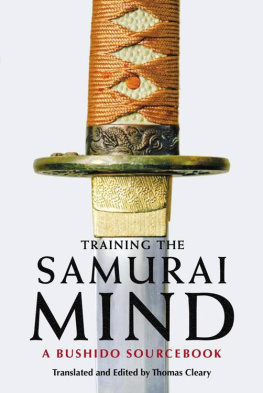BOOK 1
THE KILLING SWORD

Preface
T here is something said of old: "Weapons are instruments of ill omen; it is the Way of Nature to dislike them. To use them only when it is unavoidable is the Way of Nature."
What does this saying mean? Bow and arrow, sword, halberdthese are called weapons; this saying means these are instruments of misfortune and ill omen.
The reason that weapons are instruments of ill omen is that the Way of Nature is the Tao that gives life to beings, so to take to killing instead is indeed an instrumentality of ill omen. Thus the saying has it that what contradicts the Way of Nature it dislikes.
The old saying cited by the samurai here is paraphrased from the Taoist classic Tao Te Ching: "Fine weapons are instruments of ill omen; people may despise them, so those who have attained the Tao do not dwell with them.... Weapons, being instruments of ill omen, are not the tools of the cultured, who use them only when unavoidable." The same text also says, "Those who assist human leaders with the Tao do not coerce the world with weapons, for these things are apt to backfire."
Nevertheless, it also says that to use weapons to kill people when it is unavoidable is also the Way of Nature. What does this mean? Though flowers blossom and greenery grows in the spring breeze, when the autumn frost comes, the leaves always drop and the trees wither. This is the judgment of Nature.
This is when there is reason to strike something down when it's done. People may take advantage of events to do evil, but when that evil is done, it is attacked. That is why it is said that using weapons is also the Way of Nature.
The Master of the Hidden Storehouse, another Taoist text, presents a necessity-based defense and deterrence rationale of weaponry and warfare, in contradistinction to the impractical idealism of ideological pacificism:
"There are those who have died from ingesting drugs, but it is wrong to wish to ban all medicines because of that There are those who have died sailing in boats, but it is wrong to forbid the use of boats because of that There are those who have lost countries by waging war, but it is wrong to wish to ban all warfare on that account.
"It is not possible to dispense with warfare, any more than it is possible to dispense with water and fire. Properly used, it produces good fortune; improperly used, it produces calamity. For this reason, anger and punishment cannot be eliminated in the home, criminal and civil sanctions cannot be eliminated in the nation, and punitive expeditions cannot be done away with in the world."
It may happen that a multitude of people suffer because of the evil of one person. In such a case, by killing one man a multitude of people are given life. Would this not be a true example of the saying that "the sword that kills is that sword that gives life?"
The Master of the Hidden Storehouse says, "Ancient sage kings had militias of justice; they did not do away with warfare. When warfare is truly just, it is used to eliminate brutal rulers and rescue those in misery."
The Buddhist Scripture of the Great Demise says, "If bodhisattvas practice conventional tolerance and don't deter evildoing people, allowing them to perpetuate and extend their evil so as to ruin legitimate order, these bodhisattvas are devils, not bodhisattvas."
"The sword that kills is the sword that gives life" is a Zen expression. In Zen literature it is never employed as Yagyu uses it here, to refer to actual killing and warfare. In Zen it refers to the mystic initiation known as the Great Death, by which the limitations of artificial conditioning are transcended. The experience of life after the Great Death is richer than before, so it is said that the sword that kills is the sword that gives life.
There is a science to the use of weaponry. If you try to kill someone without knowing the science, you will probably be killed yourself.
Sun-tzu, the Chinese master of military strategy wrote, "Those who are not versed in the disadvantages of the use of arms cannot really know the advantages of the use of arms."
In matters of martial arts, the martial art involved in facing off with another using two swords has but one winner and one loser. This is very small-scale martial art; what is won or lost by victory or defeat is little. But when the whole land wins on one individual's victory, or the whole land loses on one individual's defeat, this is martial art on a large scale.
The one individual is the commander; the whole land is the military forces. The forces are the hands and feet of the commander. To operate the forces skillfully means to get the hands and feet of the commander to work well. If the forces do not function, that means the hands and feet of the commander do not work.
Just as one faces off with two swords, exercising the great function of the great potential, using one's hands and feet skillfully to prevail, in the same way, the commander's art of war, properly speaking, is to successfully employ all forces and skillfully exercise strategic tactics to win in battle.
In The Art of War, Sun-tzu wrote, "Those skilled in military operations achieve cooperation in a group, such that directing the group is like directing a single individual who has no other choice." In a commentary on Sun-tzu, the military theorist Chia Lin wrote, "If leaders can be humane and just, sharing both advantages and problems of the people, then troops will be loyal, identifying with the interests of the leadership of their own accord"
The Master of the Hidden Storehouse says, "What determines victory or defeat should not be sought elsewhere but in human feelings. Human feelings imply desire for life and repugnance for death, desire for glory and dislike of disgrace. When there is but one way to determine whether they die or live, to earn ignominy or glory, then the soldiers of the military forces can be made to be of one mind."
While it is a matter of course, moreover, to go out onto the battlefield to determine victory and defeat when two combat formations are pitched against one another, a commander pitches two combat formations in his chest to try mentally leading a great army into battlethis is the art of war in the mind.
The importance placed on the mental art of war implies that simple force is not adequate to ensure victory in the absence of successful strategy directing its employ. The success of strategic deployment is also a key factor in maintaining the loyalty and morale of the troops, demonstrating both reliability in tactical command and consideration for the welfare of the soldiers.
Not to forget about disturbance when times are peaceful this is an art of war. To see the dynamic of the state and discern when there is likely to be disruption, and to heal the disturbance before it happensthis is also an art of war.
Sun-tzu wrote in The Art of War, " The superior martial artist strikes while schemes are being laid." Tu Yu cited an emperor-general to illustrate Sun-tzu's principle: "Those who are skilled at eliminating trouble are those who deal with it before it happens. Those who are skilled at prevailing over opponents are those who win before there is formation."
Once there is peace, to give consideration to the selection of governors and administrators of all regions, and to national security, is also a martial art. When governors, administrators, magistrates, and local lords oppress the common people in pursuit of personal profit, this above all is the beginning of the end for a nation. Observing the situation carefully, planning so as to prevent the nation from perishing through the self-seeking of those governors, administrators, magistrates, and local lords, is like watching an opponent in a duel to see if he has anything up his sleeve. It is imperative to observe with utmost attention; this is what makes martial art a matter of such great moment.

